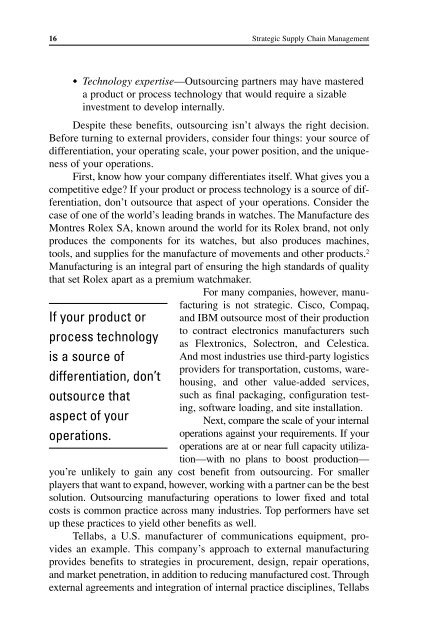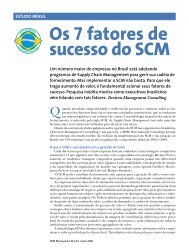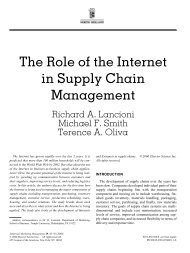- Page 2 and 3: Want to learn more We hope you enjo
- Page 4 and 5: Cohen and Roussel provide a valuabl
- Page 6 and 7: Copyright © 2005 by The McGraw-Hil
- Page 8 and 9: This page intentionally left blank.
- Page 10 and 11: viii CONTENTS OWENS CORNING PROFILE
- Page 12 and 13: x FOREWORD now it has to be brought
- Page 14 and 15: xii FOREWORD Another “early adopt
- Page 16 and 17: xiv FOREWORD through research, use,
- Page 18 and 19: xvi FOREWORD on its promise. Is thi
- Page 20 and 21: xviii ACKNOWLEDGMENTS owe thanks to
- Page 22 and 23: This page intentionally left blank.
- Page 24 and 25: 2 Strategic Supply Chain Management
- Page 26 and 27: 4 Strategic Supply Chain Management
- Page 28 and 29: 6 Strategic Supply Chain Management
- Page 30 and 31: This page intentionally left blank.
- Page 32 and 33: 10 Strategic Supply Chain Managemen
- Page 34 and 35: 12 Strategic Supply Chain Managemen
- Page 36 and 37: 14 Strategic Supply Chain Managemen
- Page 40 and 41: 18 Strategic Supply Chain Managemen
- Page 42 and 43: 20 Strategic Supply Chain Managemen
- Page 44 and 45: 22 Strategic Supply Chain Managemen
- Page 46 and 47: 24 Strategic Supply Chain Managemen
- Page 48 and 49: 26 Strategic Supply Chain Managemen
- Page 50 and 51: 28 Strategic Supply Chain Managemen
- Page 52 and 53: 30 Strategic Supply Chain Managemen
- Page 54 and 55: 32 Strategic Supply Chain Managemen
- Page 56 and 57: 34 Strategic Supply Chain Managemen
- Page 58 and 59: 36 Strategic Supply Chain Managemen
- Page 60 and 61: This page intentionally left blank.
- Page 62 and 63: 40 Strategic Supply Chain Managemen
- Page 64 and 65: 42 Strategic Supply Chain Managemen
- Page 66 and 67: 44 Strategic Supply Chain Managemen
- Page 68 and 69: 46 Strategic Supply Chain Managemen
- Page 70 and 71: 48 Strategic Supply Chain Managemen
- Page 72 and 73: 50 Strategic Supply Chain Managemen
- Page 74 and 75: 52 Strategic Supply Chain Managemen
- Page 76 and 77: 54 Strategic Supply Chain Managemen
- Page 78 and 79: 56 Strategic Supply Chain Managemen
- Page 80 and 81: 58 Strategic Supply Chain Managemen
- Page 82 and 83: 60 Strategic Supply Chain Managemen
- Page 84 and 85: 62 Strategic Supply Chain Managemen
- Page 86 and 87: 64 Strategic Supply Chain Managemen
- Page 88 and 89:
66 Strategic Supply Chain Managemen
- Page 90 and 91:
68 Strategic Supply Chain Managemen
- Page 92 and 93:
70 Strategic Supply Chain Managemen
- Page 94 and 95:
72 Strategic Supply Chain Managemen
- Page 96 and 97:
74 Strategic Supply Chain Managemen
- Page 98 and 99:
76 Strategic Supply Chain Managemen
- Page 100 and 101:
78 Strategic Supply Chain Managemen
- Page 102 and 103:
80 Strategic Supply Chain Managemen
- Page 104 and 105:
82 Strategic Supply Chain Managemen
- Page 106 and 107:
84 Strategic Supply Chain Managemen
- Page 108 and 109:
86 Strategic Supply Chain Managemen
- Page 110 and 111:
88 Strategic Supply Chain Managemen
- Page 112 and 113:
90 Strategic Supply Chain Managemen
- Page 114 and 115:
92 Strategic Supply Chain Managemen
- Page 116 and 117:
94 Strategic Supply Chain Managemen
- Page 118 and 119:
96 Strategic Supply Chain Managemen
- Page 120 and 121:
98 Strategic Supply Chain Managemen
- Page 122 and 123:
100 Strategic Supply Chain Manageme
- Page 124 and 125:
102 Strategic Supply Chain Manageme
- Page 126 and 127:
104 Strategic Supply Chain Manageme
- Page 128 and 129:
106 Strategic Supply Chain Manageme
- Page 130 and 131:
108 Strategic Supply Chain Manageme
- Page 132 and 133:
110 Strategic Supply Chain Manageme
- Page 134 and 135:
112 Strategic Supply Chain Manageme
- Page 136 and 137:
114 Strategic Supply Chain Manageme
- Page 138 and 139:
116 Strategic Supply Chain Manageme
- Page 140 and 141:
118 Strategic Supply Chain Manageme
- Page 142 and 143:
120 Strategic Supply Chain Manageme
- Page 144 and 145:
122 Strategic Supply Chain Manageme
- Page 146 and 147:
124 Strategic Supply Chain Manageme
- Page 148 and 149:
126 Strategic Supply Chain Manageme
- Page 150 and 151:
128 Strategic Supply Chain Manageme
- Page 152 and 153:
This page intentionally left blank.
- Page 154 and 155:
132 Strategic Supply Chain Manageme
- Page 156 and 157:
134 Strategic Supply Chain Manageme
- Page 158 and 159:
136 Strategic Supply Chain Manageme
- Page 160 and 161:
138 Strategic Supply Chain Manageme
- Page 162 and 163:
140 Strategic Supply Chain Manageme
- Page 164 and 165:
142 Strategic Supply Chain Manageme
- Page 166 and 167:
144 Strategic Supply Chain Manageme
- Page 168 and 169:
146 Strategic Supply Chain Manageme
- Page 170 and 171:
148 Strategic Supply Chain Manageme
- Page 172 and 173:
150 Strategic Supply Chain Manageme
- Page 174 and 175:
152 Strategic Supply Chain Manageme
- Page 176 and 177:
154 Strategic Supply Chain Manageme
- Page 178 and 179:
156 Strategic Supply Chain Manageme
- Page 180 and 181:
158 Strategic Supply Chain Manageme
- Page 182 and 183:
160 Strategic Supply Chain Manageme
- Page 184 and 185:
162 Strategic Supply Chain Manageme
- Page 186 and 187:
164 Strategic Supply Chain Manageme
- Page 188 and 189:
166 Strategic Supply Chain Manageme
- Page 190 and 191:
This page intentionally left blank.
- Page 192 and 193:
170 Strategic Supply Chain Manageme
- Page 194 and 195:
172 Strategic Supply Chain Manageme
- Page 196 and 197:
174 Strategic Supply Chain Manageme
- Page 198 and 199:
176 Strategic Supply Chain Manageme
- Page 200 and 201:
178 Strategic Supply Chain Manageme
- Page 202 and 203:
180 Strategic Supply Chain Manageme
- Page 204 and 205:
182 Strategic Supply Chain Manageme
- Page 206 and 207:
184 Strategic Supply Chain Manageme
- Page 208 and 209:
186 Strategic Supply Chain Manageme
- Page 210 and 211:
188 Strategic Supply Chain Manageme
- Page 212 and 213:
190 Strategic Supply Chain Manageme
- Page 214 and 215:
192 Strategic Supply Chain Manageme
- Page 216 and 217:
194 Strategic Supply Chain Manageme
- Page 218 and 219:
196 Strategic Supply Chain Manageme
- Page 220 and 221:
198 Strategic Supply Chain Manageme
- Page 222 and 223:
200 Strategic Supply Chain Manageme
- Page 224 and 225:
202 Strategic Supply Chain Manageme
- Page 226 and 227:
204 Strategic Supply Chain Manageme
- Page 228 and 229:
206 Strategic Supply Chain Manageme
- Page 230 and 231:
208 Strategic Supply Chain Manageme
- Page 232 and 233:
210 Strategic Supply Chain Manageme
- Page 234 and 235:
212 Strategic Supply Chain Manageme
- Page 236 and 237:
214 Strategic Supply Chain Manageme
- Page 238 and 239:
216 Strategic Supply Chain Manageme
- Page 240 and 241:
218 Strategic Supply Chain Manageme
- Page 242 and 243:
220 Strategic Supply Chain Manageme
- Page 244 and 245:
222 Strategic Supply Chain Manageme
- Page 246 and 247:
224 Strategic Supply Chain Manageme
- Page 248 and 249:
226 Strategic Supply Chain Manageme
- Page 250 and 251:
This page intentionally left blank.
- Page 252 and 253:
230 Strategic Supply Chain Manageme
- Page 254 and 255:
232 Strategic Supply Chain Manageme
- Page 256 and 257:
234 Strategic Supply Chain Manageme
- Page 258 and 259:
236 Strategic Supply Chain Manageme
- Page 260 and 261:
238 Strategic Supply Chain Manageme
- Page 262 and 263:
240 Strategic Supply Chain Manageme
- Page 264 and 265:
242 Strategic Supply Chain Manageme
- Page 266 and 267:
244 Strategic Supply Chain Manageme
- Page 268 and 269:
246 Strategic Supply Chain Manageme
- Page 270 and 271:
This page intentionally left blank.
- Page 272 and 273:
250 Strategic Supply Chain Manageme
- Page 274 and 275:
252 Strategic Supply Chain Manageme
- Page 276 and 277:
254 Strategic Supply Chain Manageme
- Page 278 and 279:
256 Strategic Supply Chain Manageme
- Page 280 and 281:
This page intentionally left blank.
- Page 282 and 283:
260 Strategic Supply Chain Manageme
- Page 284 and 285:
262 Strategic Supply Chain Manageme
- Page 286 and 287:
264 Strategic Supply Chain Manageme
- Page 288 and 289:
266 Strategic Supply Chain Manageme
- Page 290 and 291:
268 Strategic Supply Chain Manageme
- Page 292 and 293:
270 Strategic Supply Chain Manageme
- Page 294 and 295:
This page intentionally left blank.
- Page 296 and 297:
274 Strategic Supply Chain Manageme
- Page 298 and 299:
Stage 4: Cross-Enterprise Collabora
- Page 300 and 301:
FIGURE B-3 Summary results of popul
- Page 302 and 303:
280 Strategic Supply Chain Manageme
- Page 304 and 305:
282 Strategic Supply Chain Manageme
- Page 306 and 307:
284 Strategic Supply Chain Manageme
- Page 308 and 309:
286 Strategic Supply Chain Manageme
- Page 310 and 311:
288 Strategic Supply Chain Manageme
- Page 312 and 313:
290 Strategic Supply Chain Manageme
- Page 314 and 315:
292 Strategic Supply Chain Manageme
- Page 316 and 317:
294 Strategic Supply Chain Manageme
- Page 318 and 319:
296 Strategic Supply Chain Manageme
- Page 320 and 321:
298 Strategic Supply Chain Manageme
- Page 322 and 323:
300 Strategic Supply Chain Manageme
- Page 324 and 325:
302 Strategic Supply Chain Manageme
- Page 326 and 327:
304 Strategic Supply Chain Manageme
- Page 328 and 329:
This page intentionally left blank.
- Page 330 and 331:
308 Index Business strategy: metric
- Page 332 and 333:
310 Index F Faught, Laura, 175-176
- Page 334 and 335:
312 Index Mexico, 96, 196 Michelin,
- Page 336 and 337:
314 Index Regional planning group,
- Page 338:
316 Index Toys “R” Us, 53 Trace






